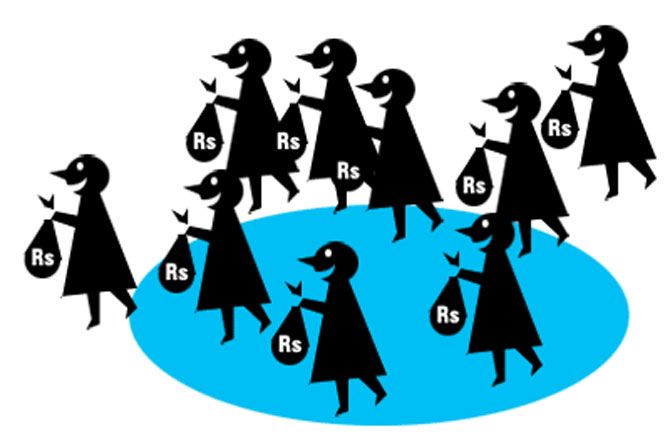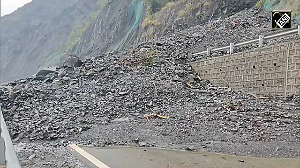The government has provided no official explanation behind the note ban that is backed by hard data, says Debashis Basu.
Illustration: Uttam Ghosh/Rediff.com

Almost the entire quantum of Rs 500 and Rs 1,000 notes have come back.
Some say this is a failure of demonetisation or the note ban strategy, which was aimed at unearthing black money held in cash.
The government has provided no official explanation behind the note ban that is backed by hard data. So, there is no yardstick by which to judge this policy.
But even someone like me, a sceptical, long-time observer of the Indian system is quite bemused that people have found so many ingenious ways to beat the note ban.
Here is a list of what I have learnt after talking to a few businessmen and tax experts.
1. Backdate sales: This has been the favourite ploy of goldsmiths.
The idea was to show the cash deposited after November 8 as having been received for sales made much earlier.
In some cases, the amount ran into hundreds of crores.
The Enforcement Directorate is going after some cases in Mumbai. Many other businesses adopted the same trick, across the country.
2. Cash-based industries: Many businesses such as transport, especially fleet operators, normally have large cash withdrawals on a regular basis.
The cash is required to pay for all costs involved in operating the vehicle, including diesel, toll, hafta and daily allowances for drivers and helpers.
That apart, money is also withdrawn from the business for personal use.
The transporters happily accepted old notes and deposited them in their accounts, turning chunks of the old withdrawals into white.
The jute mills in Kolkata were doing exactly the same thing on a much larger scale.
3. Exploit Northeast region: The buzz in Kolkata is that this is the conversion route used by many politicians.
Some tribal communities of the Northeast are exempt from paying income tax.
According to reports, thousands of crores have been transferred from other parts of the country to the Northeast.
While one light aircraft which took off from a flying school in Haryana was detained, all other consignments have gone unchecked.
We have information that the government knows about this, but may not be able to do anything.
Government establishments, including banks in the Northeast, are allowed to function only under a protection racket run by militants; the money is collected from their offices.
"Which tax officer will risk his life and go after these accounts?" asks a senior government official. There is hardly any media coverage on this issue either.
4. Multiple, simultaneous withdrawals: In the initial days of the note ban, small businessmen in Gujarat deployed dozens of staff and unemployed youth to make repeated trips to multiple banks to exchange notes.
I learn that bankers are under so much of pressure that they simply could not verify the same identification submitted repeatedly, or at different branches.
5. Jan Dhan accounts: It has already been widely reported that the balances in Jan Dhan accounts surged by tens of thousands of crores.
It is facile to tell the Jan Dhan account holders not to return this money -- they are beholden to landlords and moneylenders to do this favour.
6. Currency chests: People have been found with large amounts of new notes at a time the government was rationing it.
Cash moves from currency chests to banks and from there to the branches.
It is hard to believe that large amounts of cash was leaked from bank branches which were constantly under watch.
Were the Reserve Bank of India's currency chests compromised?
7. Cooperative banks: While the government had banned cooperative banks from exchanging old notes, multiple media reports show that this was easily circumvented in certain states.
I am told that the network of businessmen that dominates businesses across Kolkata and the Northeast have used all the above techniques in league with politicians to convert their cash.
So successful were these tricks that after a few weeks of the note ban, the discount on old notes disappeared and for a while there was even a premium for old notes.
Indeed, there is a suspicion that old notes deposited came back into the market, got deposited again and were double counted.
I gather that a senior bureaucrat, who led this campaign, believed that the note ban idea would work since it would be implemented by bankers and not the revenue department, which is seen as one of the most corrupt government departments.
Bankers turned out to be bad as any other section, rushing to cash in on 'opportunities' and 'incentives'.
The government says it intends to track down black money convertors. It cannot possibly reach everybody and is bound to fail.
As one businessman says, "The government cannot go after everybody, in the final analysis, it is between me and my assessing officer, who is now better empowered."
The real lesson for the government from the note ban is this: It is foolish to direct our lives through government fiats and yojanas.
Frame simple rules and lower taxes, and everybody may benefit.
In short, live up to the famous election promise of minimum government.
Debashis Basu is the editor of www.moneylife.in








 © 2025
© 2025